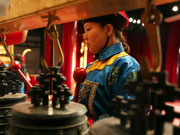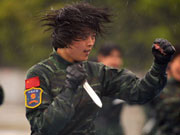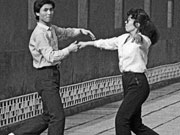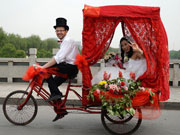Chinese acrobats exist in a world unto themselves. Zhao Xu looks at the twists and turns in their lives.
Zhao Wanting had no idea where Guangzhou was when her parents asked if she wanted to live there. But that didn't matter. She was going, no matter what. A year and a half has passed since the palpably shy 12-year-old relocated to the port city, known for its rapid development and mass of migrant workers. But the girl has had little opportunity to sample the city's metropolitan offerings. Upon arrival she was ushered directly into a strange new world in which she is meant to grow and, hopefully, prosper. It's a world that bears little resemblance to the one she knew in her rural village in Northeast China, where "Mom runs a small eatery and Dad raises goats". Yet it's also alienated from big city life.
Rather, it's a world unto itself - that is, the world of acrobatics.
It's a life dictated by monotony. Zhao and her fellow students repeat the same routines day after day.
But they have something to look forward to, and someone to look up to.
Despite their humble beginnings, they have become members of the Guangzhou Acrobatic Troupe, arguably the country's best.
In February last year, two troupe members, Zhang Quan, then 28, and Zhao Li, then 24, dazzled a national audience when they performed on the annual Spring Festival TV gala, hosted and broadcast by the country's central television station and watched by most Chinese.
They became overnight sensations.
And the duo turned a longstanding dream into reality - making acrobatics a fixture of the annual extravaganza.
"The event featured an equally indelible pair this year," Zhang says.
"It's a dream come true for us. My mother said I made her proud. She didn't cry (then) but she did when she saw me train for the first time a long time ago."
Zhang has trained for 23 years, starting from when he was 6.
He performed with various local troupes in his native Anhui province before going to Guangzhou in 2001. He has undergone everything his mother hoped and feared - success and injuries. While injuries can end a career, the pressure to stand out in such a competitive field pushes performers to take risks.
Yet acrobat Wang Sen, 21, believes the greatest challenge is posed by one's own ambitions.
"Nobody should be blamed for being ambitious," he says.
"But when your job involves doing multiple somersaults on a horizontal pole high above the ground, you've got to make sure that drive or ego, or whatever you call it, doesn't overrule judgment.
"In terms of physical capability, it would usually take at least three years for an acrobat to make a real breakthrough. There's always the next step. Consequently, we learn the essence of perseverance."
But tension is still bound to surface, especially when a big show is approaching, says Zhao, whose five-year partnership with Zhang, which culminated in their television appearance last year, is marked with memorable advancements and equally memorable conflicts.
"We fought vehemently over the slightest flaws we thought might blemish our show. We turned to rehearsal footage a colleague had recorded on his phone for evidence against each other," she says, laughing.
"It was crazy. But, trust me, at the end of the day, our shared goal always pulls us back together."
Zhao is dating a retired Olympic gold-winning diver she met through a friend.
Wang says it's rare for acrobats who work together onstage to become romantically involved.
"It's not encouraged in our troupe - understandably so," he says.
"What if they break up? Will emotions carry over into their work and make partnering onstage impossible?
"If so, that inflicts much collateral damage on the troupe itself, given it takes two or three years to cultivate a program. An acrobat can't afford to be lovelorn. Any distraction can cause permanent regret."
But while dating may not be easy, there's plenty of love in acrobats' lives.
 |

 Divine music of the Temple of Heaven goes to France
Divine music of the Temple of Heaven goes to France Beijing holds anti terrorism and riot control drill
Beijing holds anti terrorism and riot control drill Female special operation members in military skill training
Female special operation members in military skill training The last cave-dwelling tribe in Asia
The last cave-dwelling tribe in Asia Beijing in the 1980s
Beijing in the 1980s A Swiss young man's 'low carbon wedding'
A Swiss young man's 'low carbon wedding' Top 10 most expensive cars in the world
Top 10 most expensive cars in the world Delicious breakfasts from the world
Delicious breakfasts from the world Badain Jaran Desert: Amazing curves of nature
Badain Jaran Desert: Amazing curves of nature China's most luminous celebrities
China's most luminous celebrities
Day|Week|Month